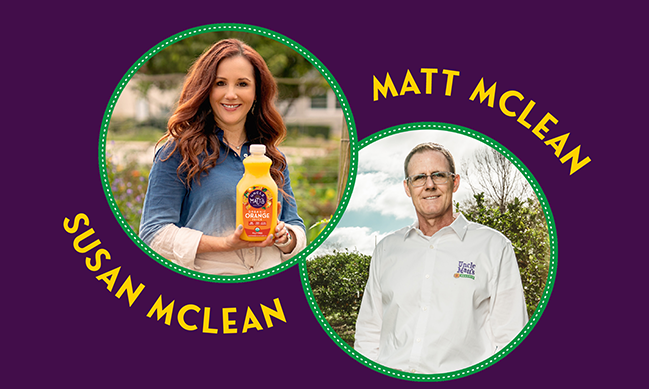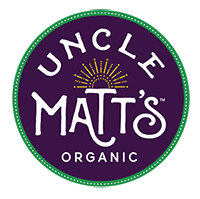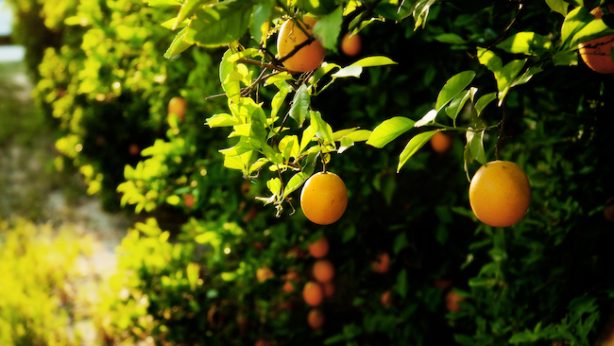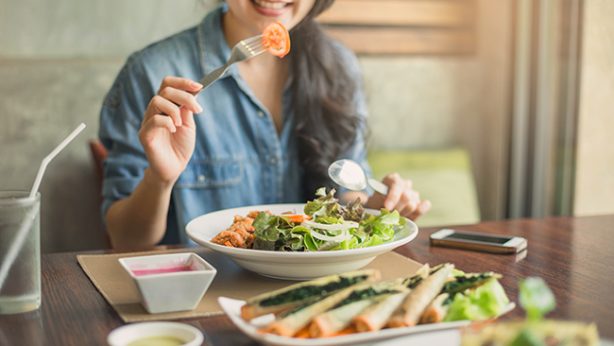Small changes, big impact: At home tips for growing your own healthy generation

We’re committed to educating a healthier generation, but we know dedication to a fully organic lifestyle takes time and research. We believe small changes can make a big impact. Consistently opting for the organic version of just one of your primary food staples should be celebrated as a big accomplishment. Then once you’ve made this change, take the next step to keep the momentum going by committing to another organic swap.
The compounding impacts of these choices will have you and your family living a healthier, more environmentally friendly lifestyle without even realizing it! The first steps are a little daunting; we get it. That’s why we’re here to provide you with helpful tips and tricks to guide you along your journey.
We sat down with Matt and Susan McLean, the husband and wife duo that steer the ship here at Uncle Matt’s Organic, to find out about how they live organically at home and get tips for how to live life more sustainably both at home, and in the workplace.
Q. Would you say you were you raised in an “organic” family? Have the benefits of organic been something you’ve been aware of from a young age?
Susan: I was not. I definitely grew up with parents who stressed healthy eating, but organic was not top of mind. It wasn’t until I was older that organic came on my radar screen. Then when I met “Uncle Matt” and learned about his mission to change our food system, I embraced the lifestyle fully. When you realize the ramifications of what’s happened to our food system, it makes you want better for the next generation.
Matt: No, but we always ate healthy and were focused on farming and agriculture. My grandfather told me he was organic by default prior to pesticides being invented in the 1940’s, but then followed the rest of industry as they became more prevalent. It was not until the late 1990’s that I approached our family about organic farming and making the transition back to how we did it before pesticides. Before then, we were conventional farmers.
Q. Growing up in the citrus industry, at what point in your life did you start to notice a difference in how your family was producing citrus compared to how others were doing this?
Matt: We didn’t convert to organic farming until I founded Uncle Matt’s in 1999. From 1999 forward, we went back to our organic roots of farming pre-pesticides. My grandfather had witnessed both systems in his lifetime, and he was thrilled for us to be going back to farming organic and holistic. He complained to me in the late 90’s that farming had pivoted to single factor analysis. If you have a pest then find a pesticide, instead of thinking holistic and asking why is that pest attracted to our farm, and can we do something different naturally to deter the pest through soil or plant nutrition. That really is the basis for problem solving in organic farming.
Q. With the rising use of harsh pesticides and herbicides in conventional farming and agricultural practices, what made your family opt to not pursue this method?
Matt: They felt the trees and soil responded much better from an organic program building healthy soil with compost and cover crops verse the conventional alternatives. I also provided the impetus by having demand for organic juice. That helped push us forward.
Q. You’re committed to fostering and educating a healthier generation. How do you practice this at home?
Susan: I take the time to show my children the differences in labels and we talk a lot about ingredients in certain foods. We discuss which things might be harmful to their growing bodies – maybe not now, but later. We talk about diet, exercise and disease. We also have conversations around our table about where food comes and how it’s grown, but there’s no better way to teach young minds than by doing! At our home, we’re fortunate to have an organic vegetable garden, and our kids participate in planting seeds, understanding seasonality, how to prevent pests and harvest – all utilizing organic growing practices. Then, you enjoy the benefits in the kitchen and the delicious “fruits” of your labor!
Matt: Well first, we purchase almost 100% organic food and household products. We also have an organic garden that teaches our kids the basics of food production and farming. My kids really respond to watching plants grow and then harvesting them for dinner. It completes the ag lesson. Gardening is not that difficult, and you can focus on easy crops that grow fast, like green beans or lettuce. We also have backyard chickens that get fed scraps from the garden. They love our collard greens, and it helps make their egg yolks dark orange and rich in nutrients. The kids can see the difference from a store-bought egg. It’s dramatic!
Q. If I were to look through your fridge and pantry, would I only find organic items? Are there any food items that you just can’t give up in an effort to be fully organic?
Susan: I totally get that some organic items are just not available in all areas. It happens, and I certainly experience this problem, too. In our house, we’re 98% organic, but I will share that organic and vegan marshmallows are not the same thing as the conventional ones for s’mores! We also have a penchant for Ghiradelli chocolate.
Matt: As close to 100% as you can get, at least that’s my goal each week. I can find organic for just about all items, but there are some kid snacks that seem to creep in every so often. The kids know dad is always lurking and will throw out any junk.
Q. You’re the proud parents of two daughters who are undoubtedly exposed to new and trendy food brands and items that might not have the cleanest labels. How do you strike the balance between promoting healthy eating while also letting them be kids when they’re around friends?
Susan: We stress moderation. Go ahead and have the food you’re interested in. Try it… but don’t overindulge. But I will say that many times, they’re underwhelmed by that particular food, sweet, or snack and their tastebuds are “trained” to recognize better, healthier food. Our bodies know!
Matt: It’s been fun to watch them grow up. They started with a good base of knowledge from their parents, and they do a good job on their own discerning healthy from junk. For me it’s more about teaching them good habits and letting them apply it to their own life. You know it’s working when they are telling you about how they help their friends eat better.
Q. What about in the office? How do you encourage environmentally friendly practices for your employees?
Susan: If we go out as a team, we try to support local purveyors that are committed to farm-to-table and/or organic foods. We also – of course – offer juices to all of the staff, and we are working towards being more responsible with our office supplies, waste and energy usage.
Matt: We obviously encourage consuming organic products in your daily routine. We have recycle bins in the kitchen and encourage everyone to conserve energy by not abusing the thermostat. We try and limit the amount of things that need to be printed. We also have work from home one day a week to help with costs of commuting.
Q. What advice do you have for someone just beginning to incorporate organic items into their diet and lifestyle so that they can have a long-term, fruitful relationship with organic living?
Susan: Baby steps! Start with one goal at a time. Then every few weeks, add another “organic” option to your lifestyle, whether it’s food choices, supporting local organic farmers, recycling your waste, volunteering to plant an organic garden, planting your own garden, or something else that excites you.
Matt: Don’t try and accomplish it all in one week. You will get overwhelmed. Similar to getting your body into physical shape for exercise, begin with small goals and work up to bigger ones. Start in the produce aisle (and of course the juice aisle) and substitute your weekly needs with organic. From there move into other staples of your diet and then household items.


